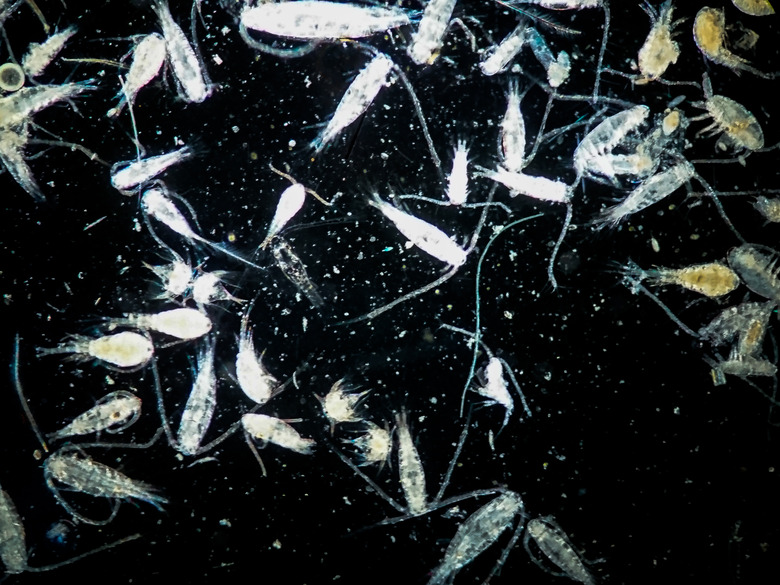Why Is Phytoplankton Important?
Phytoplankton are some of the smallest and most plentiful organisms on planet Earth; they are important to the health and well-being of many life forms in a variety of ways. The collapse of the world's phytoplankton population would have dire consequences for our environment and civilization.
TL;DR (Too Long; Didn't Read)
It's not an exaggeration to say that phytoplankton are vital to life on Earth. Not only do they form the base of the ocean food chain which also nourishes land animals and people, they also affect (and are in turn affected by) climate health.
Phytoplankton Definition and Biology
Phytoplankton Definition and Biology
Phytoplankton are microscopic, plant-like organisms that grow abundantly in the seas and oceans. Much like land-based plants, phytoplankton require sunlight, water and nutrients for growth. They get their green color from chlorophyll which also allows them to perform photosynthesis, creating their own food from sunlight and carbon dioxide. Phytoplankton live near the ocean's surface, where they obtain sunlight and depend on upwelling deep ocean currents to provide nutrients. There are also freshwater phytoplankton living in lakes, ponds and rivers.
Ocean Health Depends on Phytoplankton
Ocean Health Depends on Phytoplankton
The importance of phytoplankton is due largely to their place at the base of the marine food chain. Small fish and some larger species of fish and whales consume phytoplankton as their main food source. These fish then become prey for larger fish and marine mammals on up the chain. Dead phytoplankton fall to the bottom of the ocean and nourish shellfish and other bottom dwellers. Crashes in the phytoplankton population can have serious ramifications for the entire marine ecosystem. Variances in the phytoplankton population can be an indicator of other ocean problems, such as excessive pollution.
Phytoplankton Influence the Global Climate
Phytoplankton Influence the Global Climate
Global climate health is affected by phytoplankton population health. Phytoplankton is responsible for approximately 50 percent of all photosynthesis on Earth. This means they function as a major carbon dioxide sink, pulling the gas from the atmosphere and emitting oxygen in its place. In this way the phytoplankton population is a major factor in limiting global warming and in the general atmospheric health of the planet.
A Factor in Human Health
A Factor in Human Health
The importance of plankton doesn't stop in the water: the health of the human population is directly related to the health of the oceans and the climate. Certain species of fish that consume phytoplankton, such as sardines, serve as a food source both for humans and larger fish. Many communities worldwide depend on commercial fishing both for nourishment and employment. Without phytoplankton, the fish population and therefore commercial fishing would disappear. Humankind will also be impacted in many ways by global warming, and phytoplankton's key role in this process makes them critical to our survival.
Population Variance
Population Variance
Concerns have been raised by scientists that the hole in the ozone layer could have negative impacts on the phytoplankton population, as harmful rays from the sun could kill them. Phytoplankton are also harmed by pollutants in the ocean, such as agricultural and industrial runoff, and are often absent where pollutant concentrations are high. Nourished by nutrients welling up from the ocean floor and iron deposited on the ocean's surface by the wind, phytoplankton are at risk from changes in global climate and wind patterns. Winds drive the current upwellings which nourish the phytoplankton and also carry required minerals to the ocean. Dust from drier climate conditions can limit the sunlight and hurt the ability of phytoplankton to perform photosynthesis and survive.
Monitoring Phytoplankton
Monitoring Phytoplankton
Studies are being conducted by scientists worldwide in attempts to understand the phytoplankton populations and the factors affecting it. Tracking seawater's color change from blue to green as phytoplankton density increases has been done for decades. New technologies are allowing scientists to also determine the health and growth rates of the organisms using NASA satellite imagery. The goal is to better understand this tiny organism which is vital to life on earth.
References
Cite This Article
MLA
Agar, Robert. "Why Is Phytoplankton Important?" sciencing.com, https://www.sciencing.com/phytoplankton-important-5398193/. 22 November 2019.
APA
Agar, Robert. (2019, November 22). Why Is Phytoplankton Important?. sciencing.com. Retrieved from https://www.sciencing.com/phytoplankton-important-5398193/
Chicago
Agar, Robert. Why Is Phytoplankton Important? last modified March 24, 2022. https://www.sciencing.com/phytoplankton-important-5398193/
